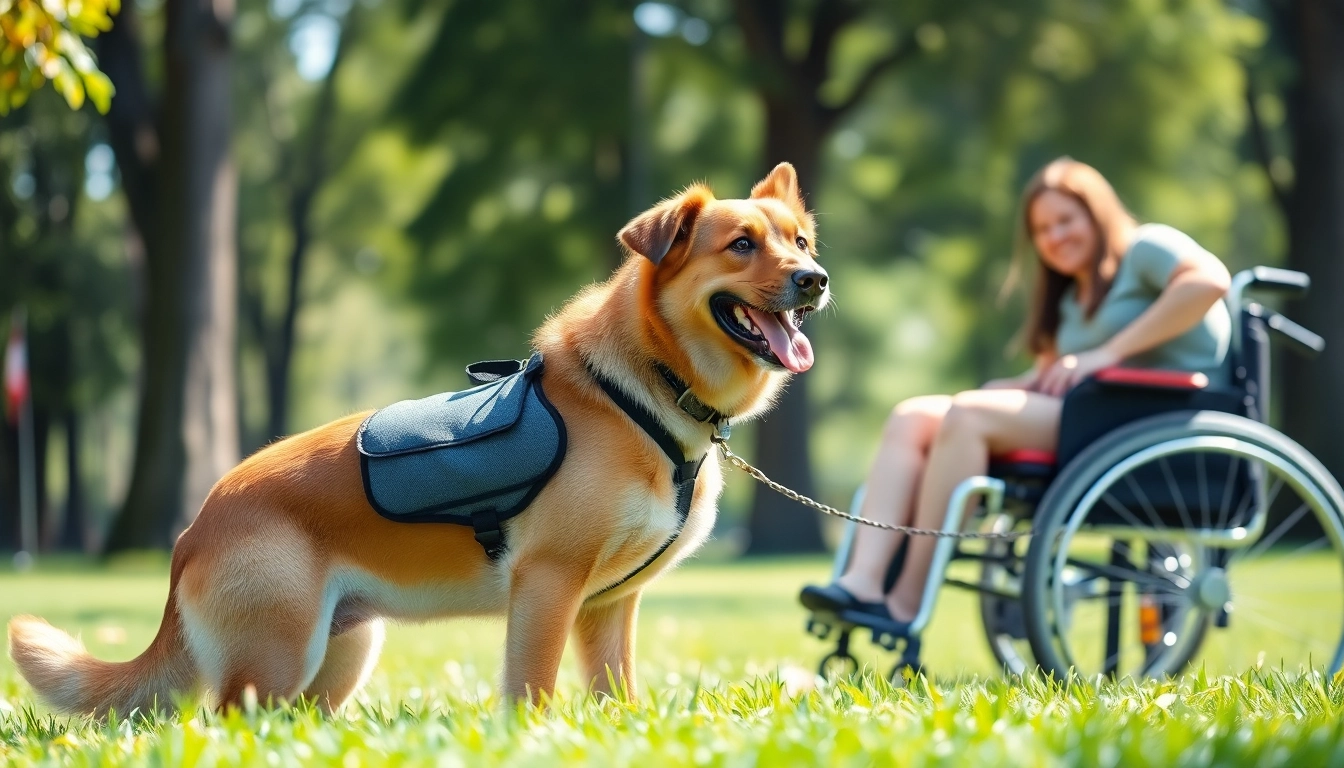
Understanding the Need to Buy a Service Dog
Service dogs have become indispensable companions for individuals facing various physical and emotional challenges. They provide not only companionship but also support that can dramatically enhance the quality of life for their handlers. Dogs trained for specific assistance roles play vital roles in helping people navigate daily challenges, from managing anxiety to assisting with mobility issues. Whether you are considering to buy a service dog or are simply curious about the advantages they offer, understanding their importance and functions is the first step in this journey.
What is a Service Dog?
A service dog is a specially trained animal that performs tasks to aid individuals with disabilities, including psychiatric and physical conditions. Unlike therapy dogs or emotional support animals, which provide comfort but are not specifically trained for tasks, service dogs are certified to perform specific duties that assist their handlers in overcoming barriers caused by their disabilities.
For instance, a service dog might be trained to retrieve medication, guide a visually impaired person, alert a person with hearing disabilities to sounds, or intervene during a psychiatric episode. These tasks are crucial; they go beyond companionship, playing essential roles in the physical and emotional well-being of those they serve.
Benefits of Having a Service Dog
The benefits of having a service dog extend far beyond the immediate practical assistance they provide. Here are a few key advantages:
- Emotional Support: Service dogs contribute significantly to the emotional stability of their handlers. They can help alleviate symptoms of anxiety, depression, and PTSD by offering unconditional love and support.
- Independence: For many individuals, a service dog can facilitate greater independence by performing crucial tasks, thus allowing them to engage more meaningfully in social and community activities.
- Physical Assistance: Many service dogs can assist with mobility challenges, fetching items, guiding, and supporting individuals who may otherwise struggle with daily tasks.
- Social Interaction: Service dogs often serve as social catalysts, making it easier for handlers to engage with others and participate in social situations.
Who Can Qualify for a Service Dog?
Qualification for a service dog varies but generally includes individuals with documented disabilities, which can be physical, psychiatric, or developmental. Common conditions that may qualify individuals for a service dog include:
- Visual or hearing impairments
- Mental health conditions such as anxiety or PTSD
- Mobility challenges related to conditions like multiple sclerosis or cerebral palsy
- Seizure disorders
It’s essential that potential handlers consult with healthcare professionals to establish a need for a service dog as part of their treatment plan.
Key Factors to Consider When You Buy a Service Dog
Evaluating Your Unique Needs
Before making the decision to buy a service dog, it’s crucial to conduct a thorough evaluation of your needs. Consider the following questions:
- What specific tasks do I need assistance with?
- Am I primarily looking for emotional support, physical assistance, or both?
- How much time and energy can I dedicate to training and bonding with the dog?
By reflecting on these aspects, you can better assess your potential partnership with a service dog and find a perfect match for your lifestyle and needs.
Training Requirements for Service Dogs
Training is one of the most critical components in the journey towards obtaining a service dog. Most service dogs undergo extensive training, typically spanning several months to years. There are two main approaches to training a service dog:
- Professional Training: Many organizations specialize in training service dogs for various types of disabilities. These programs often involve rigorous testing and certification to ensure that the dog can reliably perform the necessary tasks.
- Owner Training: Some individuals choose to train their service dogs themselves, which can require a greater commitment of time and patience. Owner training often benefits from guidance from professional trainers to ensure the dog is adequately prepared for its responsibilities.
That’s why it’s essential to understand whether you’re equipped to handle the training process or if it’s best to hire professionals for the task.
Budgeting for Your Service Dog
The cost of obtaining a service dog can vary significantly based on several factors, including training, breed, and service type. Anticipate expenses such as:
- Initial purchase or adoption fees
- Training costs, whether professional or DIY
- Veterinary care
- Routine maintenance, including food, grooming, and equipment
Investing in a service dog is often a long-term commitment, so budgeting appropriately from the beginning can alleviate stress and ensure that you can provide your new companion with the care they need.
Researching Reputable Sources to Buy a Service Dog
How to Find Trained Service Dogs
Once you have a handle on your needs and budget, the next step is to find a reputable source for your service dog. Here are some effective strategies:
- Research Organizations: Look for accredited organizations specializing in service dogs that comply with established training and ethical standards. Resources like Assistance Dogs International can help you identify credible programs.
- Consider Private Breeders: Some individuals opt to work with private breeders who have experience in training dogs for service purposes. Confirm the breeder has a good reputation and can provide references.
- Attend Events: Attending dog shows, training expos, or community events can help you connect with reputable trainers and organizations.
Questions to Ask Breeders or Organizations
It’s crucial to vet the source from which you plan to acquire your service dog. Here are some essential questions to ask:
- What is the training regimen for their service dogs?
- What kind of support do they offer to new handlers post-placement?
- Do they provide guarantees or policies regarding health issues or behavioral problems?
- How do they select and test their dogs for service work?
Having clear answers to these questions can ensure that you select a reputable source for your service dog.
Understanding Certifications and Compliance
Certification and compliance with regulations are vital for documenting your service dog’s training and capabilities. While not legally required in all jurisdictions, having certification can offer additional validation when interacting with the public and officials. Understanding the specifics of what certifications are widely recognized can help you navigate this aspect confidently.
Additionally, familiarizing yourself with local service dog laws can help you ensure compliance and understand your rights as a handler.
Preparing for a Service Dog
Necessary Equipment and Supplies
Preparation is key when welcoming a service dog into your life. You’ll need various supplies to ensure both your comfort and the dog’s functionality. These can include:
- Service dog harnesses and vests that identify the dog’s working status
- Food and water bowls
- Leashes and collars specific for service duties
- Medical supplies for emergencies and necessary grooming items
Home Environment Adjustments
Your home environment will need to accommodate the arrival of your service dog. This might involve:
- Creating a designated space for the dog to eat and sleep
- Removing hazards that may pose a risk to both you and the dog
- Identifying areas where the dog will be able to perform its tasks
Being proactive about adjustments can help foster a smooth transition for you and your new companion.
Developing a Routine with Your New Dog
Once your service dog arrives, establishing a clear daily routine is essential for integrating your new partner into your life. This should include:
- Regular feeding schedules
- Consistent training exercises
- Socialization activities to help the dog become acclimated to different environments
A consistent routine not only helps the dog adjust but also builds a deeper bond between the two of you, enhancing your support system.
Legal Considerations After You Buy a Service Dog
Understanding Rights and Regulations
Once you have acquired your service dog, it’s essential to understand the legal rights you hold. The Americans with Disabilities Act (ADA) outlines rules surrounding service dog access and defines their role. Knowing your rights can empower you to effectively navigate situations where your service dog’s presence is challenged.
Tasks Your Service Dog Can Perform
The tasks that service dogs can perform are varied and closely related to the handler’s specific needs. The ADA defines a service dog as one who is trained to perform tasks directly related to a person’s disability. This can include:
- Guiding individuals with visual impairments
- Alerting individuals who are deaf or hard of hearing
- Providing support during physical mobility challenges
- Interrupting self-harming behaviors for those with mental health conditions
Understanding these tasks solidifies the functional importance of service dogs in their handlers’ everyday lives.
Navigating Public Spaces with Your Service Dog
Part of your role as a handler will be to navigate public spaces with your service dog. Here are some tips to ensure a seamless experience:
- Prepare for potential interactions by educating the public about service dogs.
- Always follow local laws regarding service dog conduct in public areas.
- Be patient and give your dog a chance to acclimate while in public settings.
Knowing your rights while adequately preparing for public spaces will make your outings more enjoyable and less stressful.







